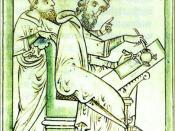Apology
In Plato's Apology, Socrates is on trial for subverting the minds of Athens' youth and not believing in its gods. The text is Plato's rendition of Socrates' defense of his alleged crimes, and his reasoning for why the allegations were placed in the first place. While many claim that Socrates was wrongly tried for trumped up charges, one must examine whether or not he was truly innocent of the root of his alleged crimes: harming the citizens of Athens in his quest to find wisdom. Socrates claims that he alone is truly helping the citizens of Athens, by showing them that they are ignorant of their own ignorance. He argues that by showing people how ignorant they truly are, they will seek to gain true wisdom, rather than that imagined. While the purpose of this quest is noble, it is in the method in which it was carried out that the crime lies.
Socrates makes himself out to be a father figure to Athens, sent by the gods to enlighten its citizens. But rather than uplift the citizens of Athens, Socrates tears them down by calling them ignorant and pointing out their lack of wisdom. No good teacher or parent would mimic this, for all that it accomplishes is ruining their self esteem, and in turn provoking a defensive response that blocks the capability to learn, rather than enhance it. Socrates endangered the peace and stability of Athens by haphazardly trying to teach his lesson without any forethought as to whether or not his way was the best way. Anyone could teach someone that guns are dangerous by shooting them, but that would obviously cause more harm than good. Socrates may not have caused any physical harm, but by tearing down the self...


